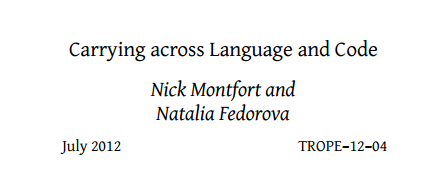Michael Mateas gave the keynote today at Intelligent Narrative Technologies 6. With reference (early on) to the Hero’s Journey, he presented a sort of “developer’s journey,” noting that indie developers (as seen at Indiecade) have been turning away from concern with structure and mechanics and toward narrative. He similarly encouraged those working in AI and narrative to turn from structuralist narratology and look at concrete traditions of narrative based in communities of practice.
I thought his repudiation of structuralist narratology was in some ways similar to someone in computer graphics objecting to the pixel or the polygon becuase pixels and polygons do not provide any guidance as to how to create beautiful images. He’s right, and if people are missing this, it’s worth pointing out. But the core problem is with one’s expectation for structural understanding. If people are interested (as Michael is) in modeling “internal processes and conflicts” mapping to “external conflicts” … what are these external conflicts made of? Aren’t they made of events? And wouldn’t it be great to have a solid model of events so more complex narrative phenomena can be built up out of them?
Michael gave us an array of options for work motivated by specific poetic ideas, and these (in keeping with his practice) were extremely grand plans, with a panpoly of dissertations needed to make real progress. His suggestions were that we build huge AI systems, implementing Beckett, Boal, detective novels, flash fiction, and the levels of intentionality in Virgina Woolf. I don’t object to attempting to deal with goals of this sort, but this tour of the interactive narrative candy store seemed to be proposing 23 different manned space missions.
My idea: Why not create & compose simple models of narrative aspects that are indeed culturally grounded and for which there is a poetics, but which seem lower-level (or easier to start on) than the ideas Michael has – aspects such as repetition (seen in Beckett, of course), ellipsis (and its relationship to suspense, as treated in Michael Young’s research), and the like?
These sorts of questions seem to have easier starting points and offer the potential to generalize to some extent across genres, while yielding specific insights as well.
A repetition or ellipsis system would be as culturally grounded as any one that Michael suggested, and it too could be “fully realized” and produce outputs.
My very simple system “Through the Park,” described in “Small-Scale Systems and Computational Creativity,” is an attempt to show how low the stairs are for those interested in investigating ellipsis. Although extremely simple, it is a real model of an aspect of narrative and has been useful to me in thinking about it.
Ian Horswill pointed out in the discussion after the talk that understanding repetition may not be easier than generating romance novels, flash fiction, or work like that of specific authors. This is true, but with repetition there are more concrete starting points. One can certainly start with a lightweight simulation of the world, and of narration, and then elaborate.
Richard Evans mentioned that the repetition in _The Odyssey_ and in Beckett’s plays doesn’t have much in common. I would say that this is true, but that they have _something_ in common – creating a coherent and distinctive texture of language. On the other hand, even within the _same work,_ or work by the same author, there will be different types of repetition that do different things. That’s what makes this aspect of narrative (or, really, textuality) a rich one. It seems to me that these different uses, within a single work or across different works, could be understood analytically and modeled computationally in useful ways. The focus on a single aspect, rather than a genre or community of practice, would make this more tractable and offer a foothold.








